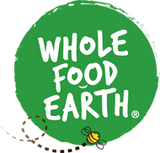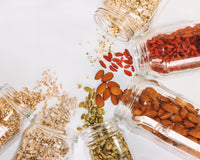Amino acids are known for being the building blocks of protein. Although the human body requires 20 different amino acids to properly grow and function, 9 of them have been dubbed as essential. Meaning, that these amino acids cannot be produced by the human body without food. Each amino acid has a very important and unique function. Some are important for mood regulation whilst others are in charge of muscle development. Here are all 9 amino acids and the roles they play in human development.
Contain All 9
|
|
Vegan Histidine Sources
Histidine helps in the creation of blood cells, it facilitates growth and tissue repair. The ultimate purpose of histidine is to turn into histamine, a vital neurotransmitter for the proper operation of digestion, immune response, sleep-wake cycles and sexual function. It also helps in the preservation of myelin sheaths which are fatty tissue sleeves that protect the nerve cells.
|
|
Vegan Isoleucine Sources
This amino acid is found heavily concentrated within muscle tissue. Isoleucine is vital for immune function, muscle metabolism, energy regulation and the production of haemoglobin. It has also been found to help in the formation of blood clots.
|
|
Vegan Leucine Sources
A critical amino acid for muscle repair and the synthesis of protein. Leucine helps stimulate wound healing, regulate blood sugar levels, and growth hormones. It is arguably the most important amino acid as it helps to build muscle mass by helping activate a pathway responsible for protein synthesis. Leucine also helps to promote the healing of muscles following severe levels of stress and trauma.
|
|
Vegan Lysine Sources
Lysine functions in the body by helping to produce a variety of enzymes, antibodies, and hormones. Lysine essentially helps in the formation of a healthy immune system. It is also very important for the creation of collagen in the body. One out of nine essential amino acids, lysine provides the structure for ligaments, tendons, hair, skin, organs and cartilage. Additionally to this, lysine helps the body absorb important minerals for a healthy immune system, like iron and zinc.
|
|
Vegan Methionine Sources
Methionine is responsible for helping the bodys’ detoxification and metabolism. Its role in the body is to help remove heavy metals such as mercury and lead from our bodies. Sulfur traces found in this amino acid operate as an antioxidant, protecting cells from harm of free radicals. Not having enough sulfur in our bodies makes people more susceptible to damaged tissues, problems with healing properly and arthritis. Additionally methionine helps in breaking down fat preventing deposits from building up in the liver. A word of caution though, too much of this amino acid can lead to these same fatty deposits occurring in arteries (atherosclerosis).
|
|
Vegan Phenylalanine Sources
One out of nine essential amino acids, Phenylalanine helps our bodies in many ways. It helps create other amino acids such as tyrosine, used to help produce neurotransmitters such as dopamine. Phenylalanine is also a precursor for hormones in the thyroid, regulating your metabolism. It also helps develop other important brain chemicals and aid in the regulation of adrenaline.
|
|
Vegan Threonine Sources
Threonine is largely found in peoples’ brains and spines, namely, the central nervous system. Studies have found that threonine can be helpful in treating different kinds of depression, it also plays an important role in maintaining your skin and teeth healthy. Threonine changes into a chemical known as glycine once in the body, this chemical helps in the production of collagen, elastin, and muscle tissue. When glycine is combined with methionine (a previously mentioned amino acid) it helps in the prevention of liver failure and the processing of fatty acids.
|
|
Vegan Tryptophan Sources
The consumption of tryptophan is crucial as it is of predominant importance for the production of serotonin. Serotonin helps to regulate moods, sleep, appetite, pain and can also act as a natural sedative. Much like phenylalanine, tryptophan is also a precursor amino acid respectively, for melatonin. This hormone (melatonin) helps regulate sleep, having sufficient amount of sleep is crucial for the bodys’ proper nervous system to function along with immune response.
|
|
Vegan Valine Sources
Valine is involved in energy production, helping to stimulate activity in the body while simultaneously maintaining mental and physical stamina, muscle growth and regeneration. It helps support the central nervous system my keeping it calm.
|
|






